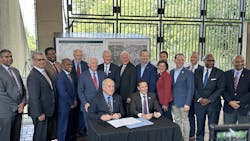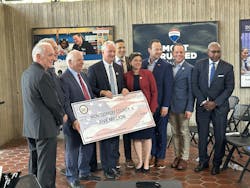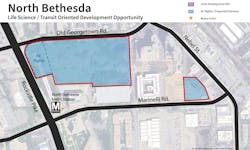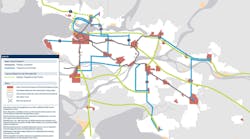TransLink and PCI Developments (PCI) are looking to build a new mixed-use development project near the future Arbutus SkyTrain Station on West Broadway and Arbutus, B.C. while the Washington Metropolitan Area Transit Authority (WMATA) and Montgomery County, Md., are seeking an experienced developer to build a major transit-oriented life sciences center at the North Bethesda Metrorail Station.
TransLink
TransLink and PCI’s re-zoning application for a new mixed-use development project near the future Arbutus SkyTrain Station on West Broadway and Arbutus, B.C., has recently been approved by the Vancouver City Council.
Once complete, revenues from the development will be invested into Metro Vancouver transit services. The goal of TransLink’s Real Estate Development Program is to generate a new long-term revenue stream for transit services in Metro Vancouver. However, TransLink is still seeking a new sustainable funding model to ensure transit services can expand as the population grows.
“TransLink’s Real Estate Development Program is part of our efforts to leave no stone unturned when it comes to generating new revenues,” said TransLink CEO Kevin Quinn. “I’m proud that this development will increase access to transit, generate much-needed revenue for transit services and help increase the housing supply in our rapidly growing region.”
Located next to the future terminus of the Broadway Subway, an incoming bus loop and the Arbutus Greenway mixed-use walking and cycling path, the project will be TransLink’s first development under the Real Estate Development Program.
TransLink and PCI have formed a partnership to develop the land on the southeast corner of Arbutus and Broadway. The development will include:
- 30 stories of mixed-use residential and commercial space.
- Street-level retail and more than 200 rental homes, 20 percent of which will be rented at below-market rates and secured for moderate-income households.
- Community space that will serve as the future home of the Ohel Ya’akov Community Kollel, a Jewish cultural, education and neighborhood center.
“With our project and community partners, including TransLink, PCI is dedicated to building more rental housing, including below-market rental, to proactively participate in addressing Metro Vancouver’s rental housing shortage,” says PCI Developments President Tim Grant. “This development builds on our company’s long-standing commitment to transit-oriented development, which helps to make urban communities more inclusive, livable and sustainable.”
The next step for the project is to finalize development and building permits before construction, which is projected to begin in late 2025. TransLink and PCI are targeting 2029 for the development’s completion.
WMATA/Montgomery County, Md.
WMATA and Montgomery County officials launched an initiative July 24 to seek an experienced developer to build a major transit-oriented life sciences center at the North Bethesda Metrorail Station that will include housing, office, retail and public spaces.
WMATA issued a Request for Qualifications for a developer with experience creating life science hubs. After selecting a developer later this year, the agency will negotiate a Joint Development Agreement, allowing the developer to develop the 13.9 acre site. The project is anticipated to include approximately 2 to 3.7 million square feet of development.
Montgomery County Executive Marc Elrich and WMATA General Manager and CEO Randy Clarke signed a Memorandum of Understanding, affirming the county’s and WMATA’s roles and commitments to the project.
“This is a win for Metro [WMATA], a win for the county and a win for the region,” said WMATA General Manager and CEO Randy Clarke. “Metro’s [WMATA] strategic plan calls for maximizing the use of our land for the benefit of the region and to increase ridership with new transit-oriented development. This agreement is the first step to transform an empty field into a world-class life science-anchored community.”
The county, with the support of its Congressional and state delegations, is providing infrastructure funding and economic development incentives. WMATA notes it has also helped establish a higher education-affiliated research institute to attract life science and technology businesses.
"In just a few years, the North Bethesda Metro station will become the epicenter of the region’s life science community – rarely has our region seen such a valuable placemaking opportunity for development," said Montgomery County Executive Marc Elrich. "By transforming the North Bethesda Metro Station area into a premier life sciences and mixed-use development, we are creating jobs, stimulating our local economy and fostering a vibrant community where people can live, work, learn and innovate. As I have traveled around the world and throughout our nation targeting life science and other advanced technology companies, this property, anchored by the University of Maryland Institute for Health Computing, has generated an incredible amount of interest. I expect that we will see a lot of world-class development companies bidding to build this space into something that many others will try to replicate."
The University of Maryland’s Institute for Health Computing will anchor the future development. The newly formed research and technology institution is planning to locate its permanent headquarters on the site, which is expected to generate spin-off jobs.
"The University of Maryland is committed to investing in people and communities, partnering to advance the public good and taking on the grand challenges of our time,” said University of Maryland College Park President Darryll J. Pines. “The Institute for Health Computing is a groundbreaking center of research and discovery that makes the lives of all Marylanders better while simultaneously creating economic benefits for our region. This kind of innovation only happens when partners throughout academia, government and industry come together around a shared vision of progress.”
“As a proud anchor of this transformative development, the University of Maryland's Institute for Health Computing looks forward to pioneering advancements that will shape the future of health research and technology,” said University of Maryland, Baltimore President Bruce E. Jarrell, MD, FACS. “This strategic partnership exemplifies our dedication to not only fostering cutting-edge discoveries, but also driving economic development for Maryland.”
Congressional, state, and local elected officials from Maryland and Montgomery County highlighted the public investments and commitment to the project, which include infrastructure and higher education funding from federal, state and local operating and capital funds.
Maryland Sens. Chris Van Hollen (D) and Ben Cardin (D) presented a $5 million check that will help pay for planning and preliminary engineering for a new north entrance to the North Bethesda Metro Station.
The state of Maryland is providing assistance as well.
“MDOT stands united with Team Maryland in support of transit-oriented development because we know the many proven benefits it brings to our communities,” said Maryland Department of Transportation (MDOT) Secretary Paul J. Wiedefeld. “Creating dense, walkable, mixed-use development near transit stations will further connect Marylanders to jobs, housing and other life opportunities. MDOT is proud to be part of Maryland’s commitment to support the ongoing planning of the North Bethesda Joint Development Project.”
The county has already secured $36.6 million in local, state and federal funding for infrastructure supporting the project, including streets and utilities, public open spaces and transit improvements. The county is also willing to work with the selected developer to address any other infrastructure needs.
Montgomery County officials are also seeking a $25 million United States Department of Transportation Rebuilding American Infrastructure with Sustainability and Equity grant to help integrate a new north entrance to the Metrorail station into a building on site.

Brandon Lewis | Associate Editor
Brandon Lewis is a recent graduate of Kent State University with a bachelor’s degree in journalism. Lewis is a former freelance editorial assistant at Vehicle Service Pros in Endeavor Business Media’s Vehicle Repair Group. Lewis brings his knowledge of web managing, copyediting and SEO practices to Mass Transit Magazine as an associate editor. He is also a co-host of the Infrastructure Technology Podcast.









